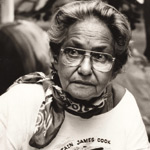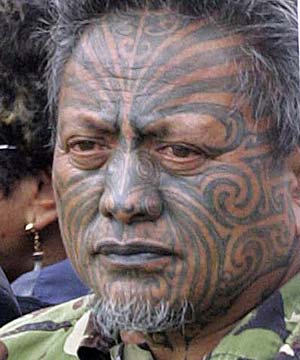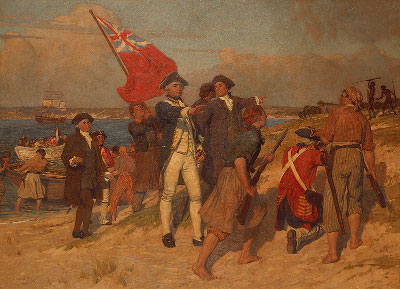INTERNATIONAL WOMEN’S DAY MARCH 8, 2008
To Everything, Turn, Turn, Turn…
There Is A Season, Turn, Turn, Turn…
There Is A Time For Peace, Turn, Turn, Turn.
My name is Fiona Noble. I do Treaty under the Sacred Treaty Circles of Oodgeroo of the Tribe, Nunuccal, I am a mother of four children, two of which have non-Indigenous fathers and two of which have an Indigenous father.
Oodgeroo advocated “Don’t hate, educate”, and she maintained that the only healing that could come about in this country was through Treaty. Her family continue to do her law in the face of ongoing genocidal practices.
I would like to begin here with a poem Oodgeroo Nunuccal (Kath Walker) wrote for her son Denis, and which I would like to read for all my children, but especially to my son, Djindu, whom I hope will grow to be a fine warrior for peace, as are and have been his fathers.
Son of Mine (To Denis)
 Oodgeroo of the tribe Noonuccal, Custodian of the land Minjerriba.
Oodgeroo of the tribe Noonuccal, Custodian of the land Minjerriba.
My son, your troubled eyes search mine,
Puzzled and hurt by colour line.
Your black skin soft as velvet shine;
What can I tell you, son of mine?
I could tell you of heartbreak, hatred blind,
I could tell of crimes that shame mankind,
Of brutal wrong and deeds malign,
Of rape and murder, son of mine;
But I’ll tell instead of brave and fine
When lives of black and white entwine,
And men in brotherhood combine –
This would I tell you, son of mine.
I am writing this letter because I am deeply disturbed with where women are at in this country, not only with the continuing difficulties all women world wide experience but more importantly with the role of the western mind set white women especially continue to uphold, continue to be in denial about, and which is essentially the root of the problems western women would consider to be universal to all women.
The society we see around us, the matrix in which we exist and often feel oppressed by, that which stems back to the Roman Empire, is based on a culture of man-made law as opposed to natural /God’s law, greed, self engrandisment, false idols, violence, and a lack of respect and understanding for spirit and country.
I am writing today to urge non-Indigenous women in this country to get real about who they are in this country, to be responsible for what has happened and what is continuing to happen. I urge all non-indigenous women who want to stop the Northern Territory Intervention, who want to see the social and economic conditions of Indigenous people improve, I urge you, to stop seeing your selves as saviours – you aren’t.
You are in fact the ones who need saving. Non-Indigenous people in this country are ‘rubbish people’ – no law, no dreaming. The only way this can be rectified is to acknowledge Aboriginal sovereignty, and to do Treaty, and I mean ‘do’ Treaty, not wait for it to come and get dropped in your lap. “Faith without action is blasphemy”!
I would like to express to you briefly my own experiences. I grew up on military bases around Australia and when I became an adult, I chose to put all my energy into ‘fighting for peace’ but as yet I have been unsuccessful in tearing down the military industrial complex. Then through my peace activities I became involved with women’s rights and issues. I worked in women’s refuges for many years, did anti-military actions with Women for Survival, helped set up Women Behind Bars ( Bris.) etc, etc .
The problem was, unfortunately I mistook feminism for women’s business which I have only in recent years come to fully appreciate. Through my activities with the peace and women’s movements I also became acutely aware of the prison industry. My reason for being then became to ‘raze the prisons’ to the ground – another unsuccessful mission I set for myself.
After many years of feeling like I was hitting my head against a brick wall, where nothing seemed to have changed and in fact, where things had even gotten worse – in my ego state – I became disillusioned. There didn’t seem to be any sisterhood in the sisterhood, the anarchists, with whom I ran with, either went turn- cote or became manic depressives, etc. etc. The point is – what I had been doing, was exactly that – hitting my head against a brick wall and then wondering why it hurt. We can all have ‘issues’ dear to us, things we want to change, but they will remain just that -‘ issues’- until we address the root problem, and that is our lack of spirit and connectedness to country.
Once you do acknowledge who’s land you are on, once you acknowledge you know nothing about this country, once you bow down, chuck away everything you think you know and realise that most of what you think you know is utter crap, then you can begin to learn.
I have heard comments from white fella’s who say they know about spirit and country because they can ‘intuit’ it, they can go into someone else’s country sit under a tree or whatever and ‘intuit’ Baiame and the rainbow serpent moving – just like that! We are all spirit and we all seek spirit but it doesn’t mean we know it, own it, control it. One woman said to me about such individuals – People like that are like leaves blowing in the wind, blowing around and around, eventually blowing right away. She said she’d rather be connected to the tree.
In 1998 through my prison activities, I met the father of my two youngest children. He was stolen from his Pitjanjatjara family in S.A. when he was three and grew up in institutions. I was on a huge learning curve. He used to say to me “Chuck away my political ism-schisms” or, similarly, as my other husband says “You have to come to this like a child”. And so I am passing on to you what I see is essential for non-indigenous people to do before they can effect any real change – whether it be for the environment, the military, domestic violence, whatever. We need to get the proper authorities and disciplines right firstly, with the restoration of elders in council – blood lines back to territory. We truly need to seek truth and spiritual oneness.
Australia has the highest youth suicide rate in the world, and that’s white fella’s. “Why is this so?” you might ask.The lack of spirit, respect, the ongoing lies and thievery, and the belief in white superiority, which everybody seems to want to deny, is taking its effect. You can’t commit genocide, and expect no consequences.
My family is currently in a state of total chaos at the moment because of the factors I have just mentioned. The two fathers of my non- Indigenous children, in their arrogance and ignorance, are committing genocide on my family as we speak.
Knowing full well the failure of the white police and judicial systems to address anything, knowing full well that police kill blackfellas in jail – they have decided to use the police and the state and my two daughters to ‘divide and conquer’ once again. They may say they are against the invasion of the Northern Territory but fail to see that their own actions give testimony to such genocidal practices. What they are doing is as the rest of white Australia is doing – pointing the finger at blackfella’s to divert attention away from their own insidious behaviour. They like the rest of white Australia don’t seem to want peace.
They do not seek healing but ego gratification. They as white, wealthy, academics see them selves as superior to me and my family because they are white and they think they are men, and they think they know better. Like the Government is doing – they say sorry, and kick you in the guts again. And it’s not good enough.
The military invasion of the N.T. is in no ones interest except white Autsralia. I didn’t see activists running to the N.T. to stop the invasion. I saw people run to Shoalwater Bay for the military exercises – everywhere but the N.T.
. I was in Canberra for the convergence to ‘stop the N.T. Intervention . People from the N.T. weren’t there to hear “sorry, now off you go back home”. They want it stopped. This intervention is extending into other states. Whitefellas are now starting to experience some of the tactics of the oppressive regime. As James Baldwin said “if they come for me at night, they’ll be coming for you in the morning”.
So finally, I would just like to reiterate the need for non-Indigenous women to stop focusing on how right they are, to stop blaming everyone else for their problems, to stop being so self righteous and judgemental.
Put your right to be an individual aside for five minutes, and start listening to the Indigenous women and men in the communities.
There are those who do things for mammon and ego and there are those who do things for spirit. Who are you? There are those who will judge others and accuse others. Ask yourself, what are their motivations and what are your own?
Please prioritise in your lives redressing the ongoing genocide. Support the move for Sovereignty; support a Treaty process; support international condemnation of this Australian govt. and the culture of genocide.
If you are interested in doing Treaty and supporting the move toward Sovereignty, you can obtain further information by contacting me on 0402541548
email – moongalba1@yahoo.com.au.
Or you can support the Aboriginal Embassy in Canberra, which is desperately seeking support to drive Sovereignty, Treaty, and “Stop the Intervention”.
Peace, prosperity and healing,
Fiona Noble (Sacred Treaty Circles of Oodgeroo, Custodian of the Land Minjerribah)
Useful Readings….
Oodgeroo’s works
Germaine Greer – White Fella Jump Up,
Henry Reynolds – Law of the Land



